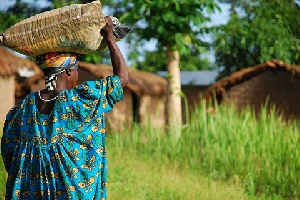 File photo of an African woman.
File photo of an African woman.
By Alex Blege
Women’s participation in development and politics is a human rights issue - a precondition for Sustainable Development. This had been captured in the Millennium Development Goals (MDGs 2000-2015) and the current Sustainable Development Goals (SDGs 2015-2030).
Both development frameworks state, MDG 3, “Promote gender equality and empower women”; SDG 5, “Achieve gender equality and empower all women and girls”. Although, the MDGs have been upgraded to the SDGs, it’s necessary to state it.
Gender equality is accepting and valuing equally the difference between men and women and the diverse roles they play in society. Women Empowerment is in three levels:
unequal power relations are transferred and women gain greater equality with men; at the government level, women’s empowerment would include the extension of all fundamental social, economic and political rights to women; finally, at the individual level, it is the process by which women gain inner power to gain their rights, gain greater self-esteem and control over their own lives in personal and social relationships.
In spite of the above facts, women have faced various challenges in their attempt to take part in leadership positions – these include: political, socio-economic, ideological and psychological (or socio-cultural).Also Fawcet Society (2004), a women’s NGO in Britain, sums it in four Cs: cash, childcare, culture and confidence.
Politically, women have found the environment to be unfriendly due to the following factors: the masculinity model of politics, lack of internal party and financial support, access to political network and stringent standards towards women; lack of sustained contact, cooperation with other public organisations eg labour unions and women’s groups, lack of access to leadership training institutions for capacity building and electoral systems that are unfavourable to women.
Socio-economically, there is a significant influence in the opportunities that are made available for women to participate in politics. This has to do with lack of inadequate financial resources; illiteracy and limited access to education and choice of professions, and the dual burden of domestic tasks and professional tasks and professional obligations. In addition, poverty has been feminised.
Socio-culturally, gender ideology, cultural patterns, and predetermined social roles assigned to women, lack of confidence to stand for election, negative perception of politics and the media portrayal of women – women are portrayed as wives and home makers and objects of advertising.
African societies are mostly patriarchal and this tradition favour sexually segregated roles, and traditional cultural values become the bane of total participation of women in leadership positions.
With the foregoing assertions, it’s important to note that culture is related to development. Culture defines the total understanding of a people – how they respond to their immediate and remote environments. This understanding is exhibited in the values, customs and norms, and orientation.
Development on the other hand seeks to identify what aspects of culture hinders the progress of human societies – human societies are dynamic, thus there is the need for a consideration of values, customs and norms and orientation that makes a society static and underdeveloped. Society is dynamic. Culture is endemic. Development must then be gradual, persuasive and continuous.
Women issues must be tackled from the grass root level. Women are not homogenous; therefore, their needs and wants are different. The debate about women participating at leadership positions should not be restricted to the educated woman and only the urban level.
Gender equality and women empowerment must be pervasive. It must begin at the bottom of the ladder. Advocacy strategies to ensure that women participate in all spheres of national development should begin in the rural areas where girls and women are denied their fundamental human rights on the basis of culture.
There must be a deliberate attempt at empowering women at the rural level economically and socially – the beginning of true Affirmative Action. Affirmative Action must be simultaneous and holistic: while it advocates for increased number of women in parliament, and in all sectors of national development; it must be targeted at empowering girls and women at the rural level.
Affirmative Action must be persuaded to ensure that the strategies applied are ones that become sustainable – although Affirmative Action is a temporary measure in correcting a wrong that has been perpetuated over a period of time.
There must be sufficient budgetary allocation to the Ministry of Gender and Social Protection, Department of Social Welfare, Department of Community Development and the Metropolitan, Municipal and District Assemblies to push Affirmative Action agenda to ensure the realisation of the Sustainable Development Goals.
Affirmative Action must become a law. We’ve nothing to lose except discrimination against women – at rural and national levels respectively. Women’s issue is a development matter – a Sustainable Development Goal at that.
The writer is a freelance journalist with interests in human and social development, and sustainable development.
Writer's e-mail: kwameselom12@gmail.com